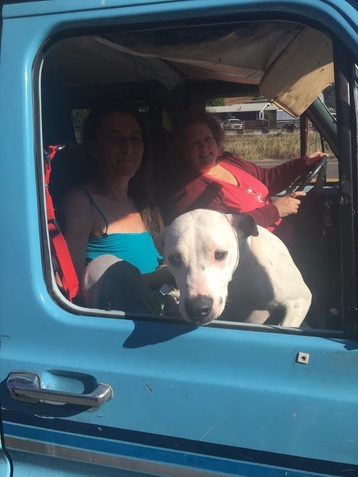 I responded to a friend's plea for help the other day. She had been contacted by a couple who are living in their van, because they were stranded out in Banks. I live 20 minutes from Banks and I have AAA, so of course I replied -- it just made sense. I had never met the couple, but I know that they've been very helpful in distributing food and other donations to the homeless community in an east-downtown neighborhood where they usually live. They had gone to Banks for some farming work and needed to get home. So Wendy and I went out to Banks after we'd picked up a truckload of rice. We had to wander around a bit to find Paul & Karen and their van. They have a phone but weren't answering. But Banks is a blink-and-you'll-miss-it kind of town and we found them easily. The van is unmistakable. It's blue, mostly, and quite loaded down. Karen calls it her hippie van, which is accurate. It has decals and paint and character all over it. It's old and worn and looks like it's held together with duct tape and baling wire.. Four dogs live in the van with them -- three mid-size and one large. And a cat. They pile the bedding on top in the daytime. At night, two of the dogs sleep with them and the other two on the sofa. A lot of the circumstances of Paul and Karen's lives are quite normal. I know plenty of people with multiple pets, with hand-me-down furniture and limited space. Most of them don't live in vans, but more are downsizing all the time, realizing that tiny homes are enough, that too much stuff just bogs us down, and that mankind has to smarten up or suffer the consequences. Paul and Karen are pre-retirement age with grown kids, and their little home is enough for them. They both have disabilities that have interrupted their careers. Social security takes years and tenacity, and they're both mid-way through the process. They've been calling the van home for a year and a half. They aren't losers or lazy or drug addicts. They aren't criminals or moochers or a burden on society. They're kind, generous, gentle, happy people who were ridiculously grateful that we showed up to lend a hand. To make a long story longer, we got them home. The van worked and we didn't have to call AAA after all. When we reached their home base, neighbors came out and greeted them (from the tent camp across the street and from inconspicuous alleys). These people have learned to live under the radar. Not because they have anything to be ashamed of or are doing anything wrong. They just need a safe haven away from judgment, from an uninformed public that tends to call the police or start an argument because they're on public land, or worse, to ignore them, to avoid their side of the street, to have a mindset that we shouldn't feed them because it'll just make them come back, as if they were stray cats. Paul and Karen are home. They're content and back to work, building community where there is none, providing for other stray cats of humanity because so many of us won't. So far, they've been reasonably safe from the violence that comes with street life, because everybody knows how kind, generous, and helpful they are -- everybody who recognizes them as human, at least. Paul and Karen bring dignity to their community, something that we outsiders can't do for them. Right now, dignity is their gift to the world. It's a big one. I was honored to spend a few hours getting to know them.
0 Comments
Leave a Reply. |
AuthorSusie Snortum is passionate about improving society's compassion for meeting basic human needs -- food, shelter, clean water, and dignity. Archives
September 2020
Categories |
We appreciate your support!
Hours
|
Telephone
|
Email
|
ADDRESS: 17850 NW Park View Blvd, Portland, OR 97229 United States

 RSS Feed
RSS Feed